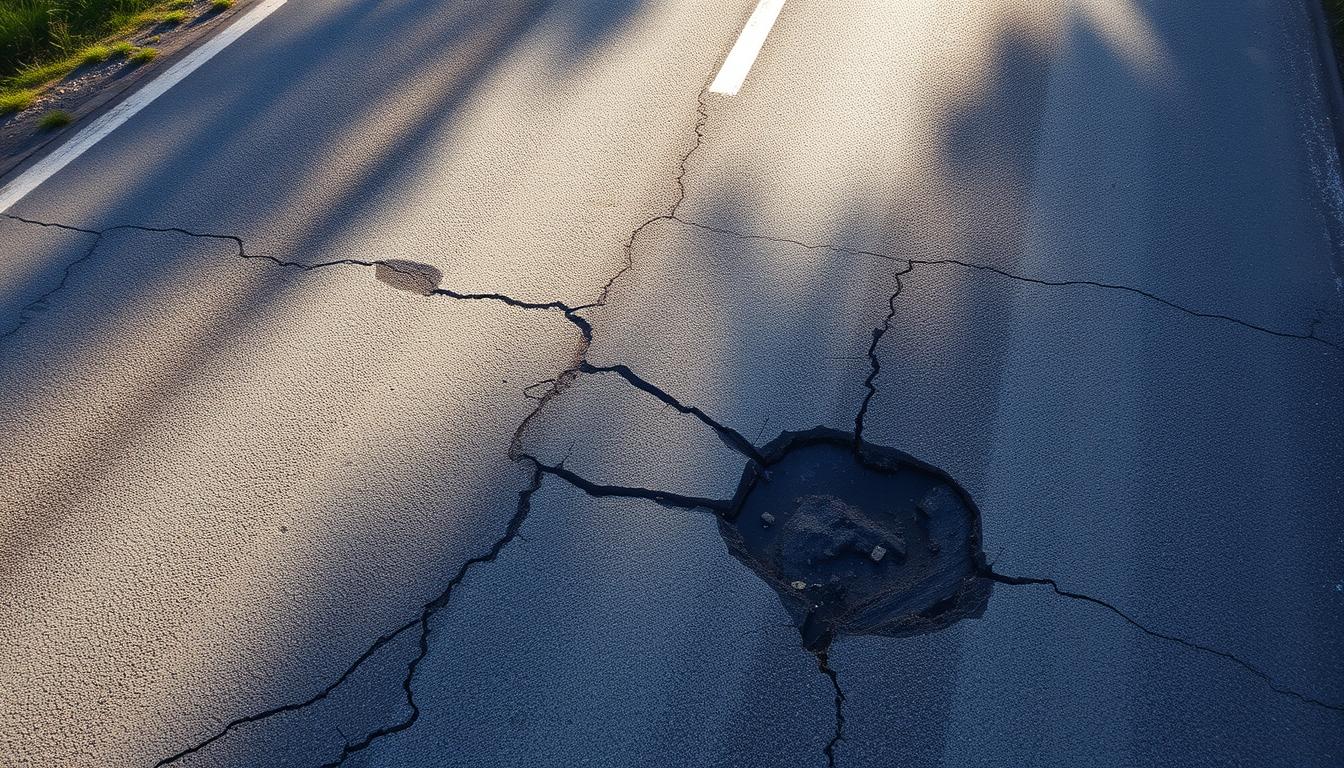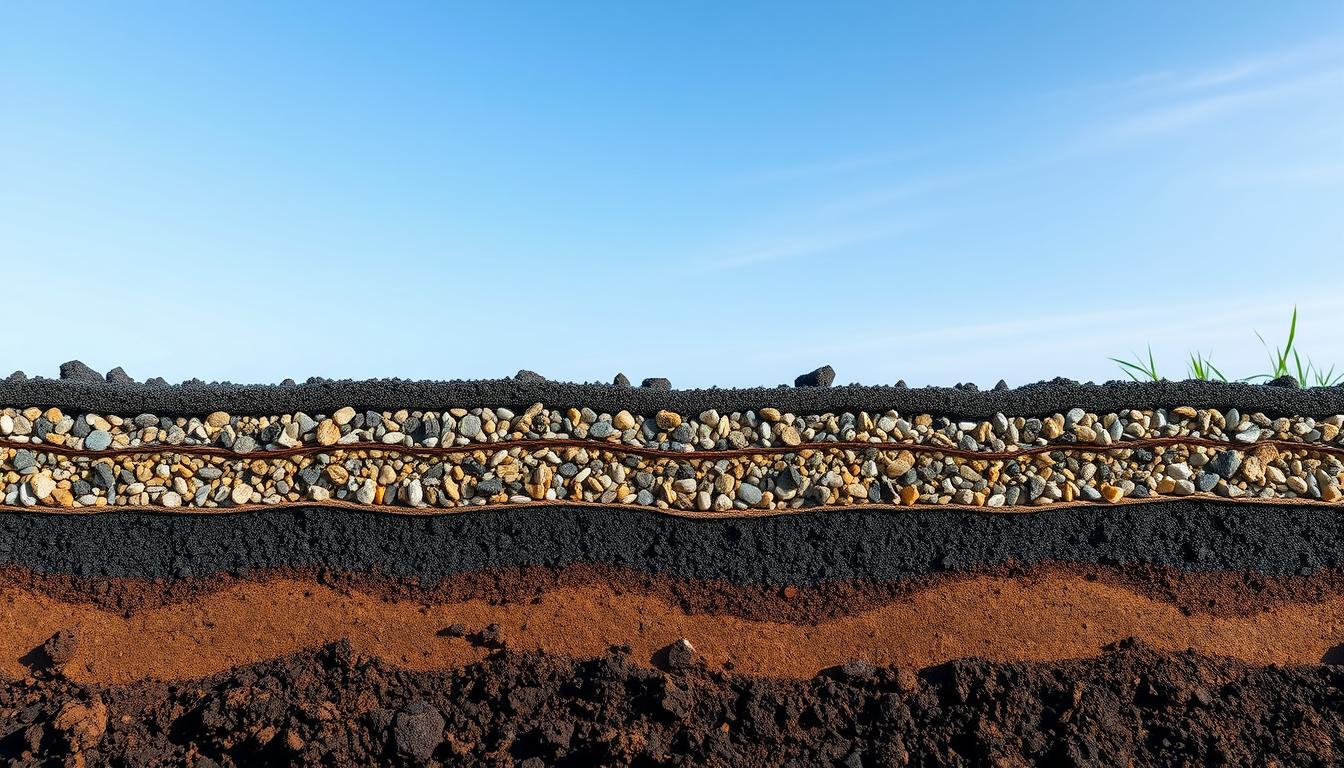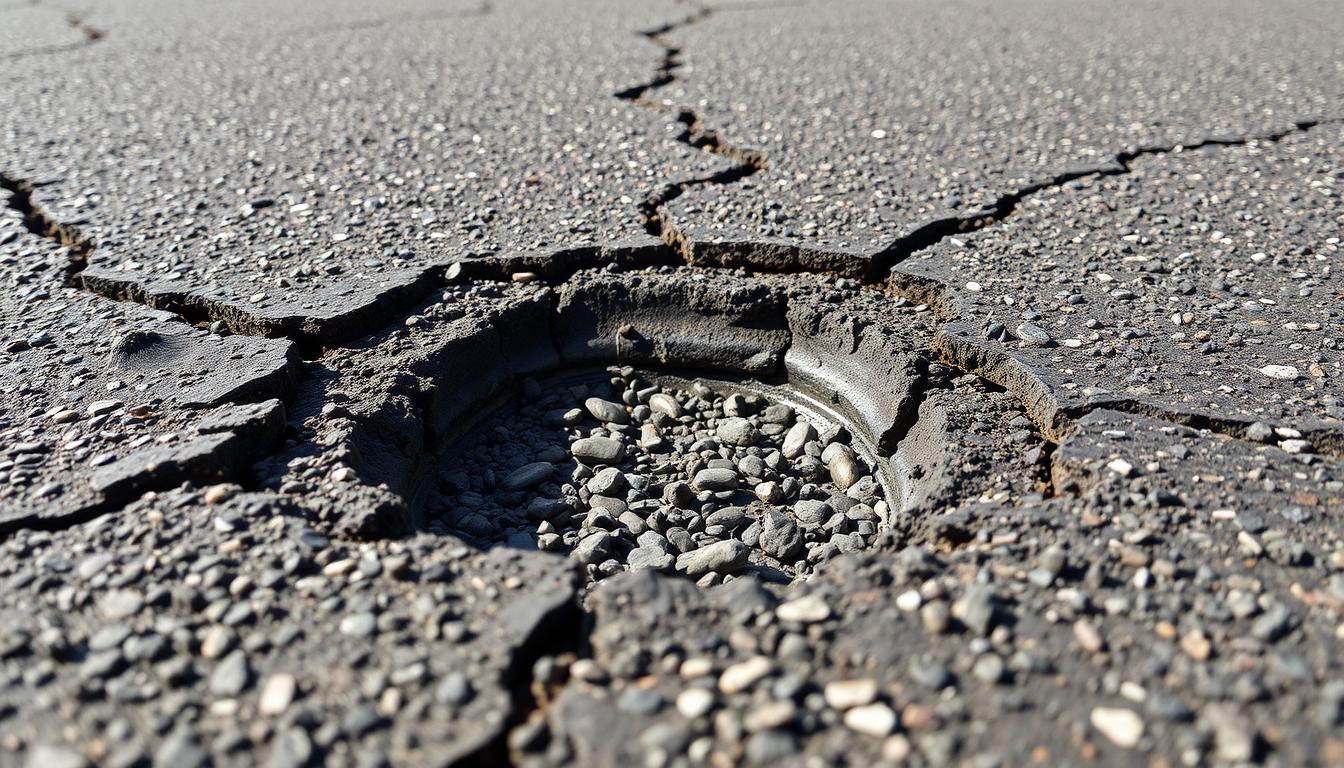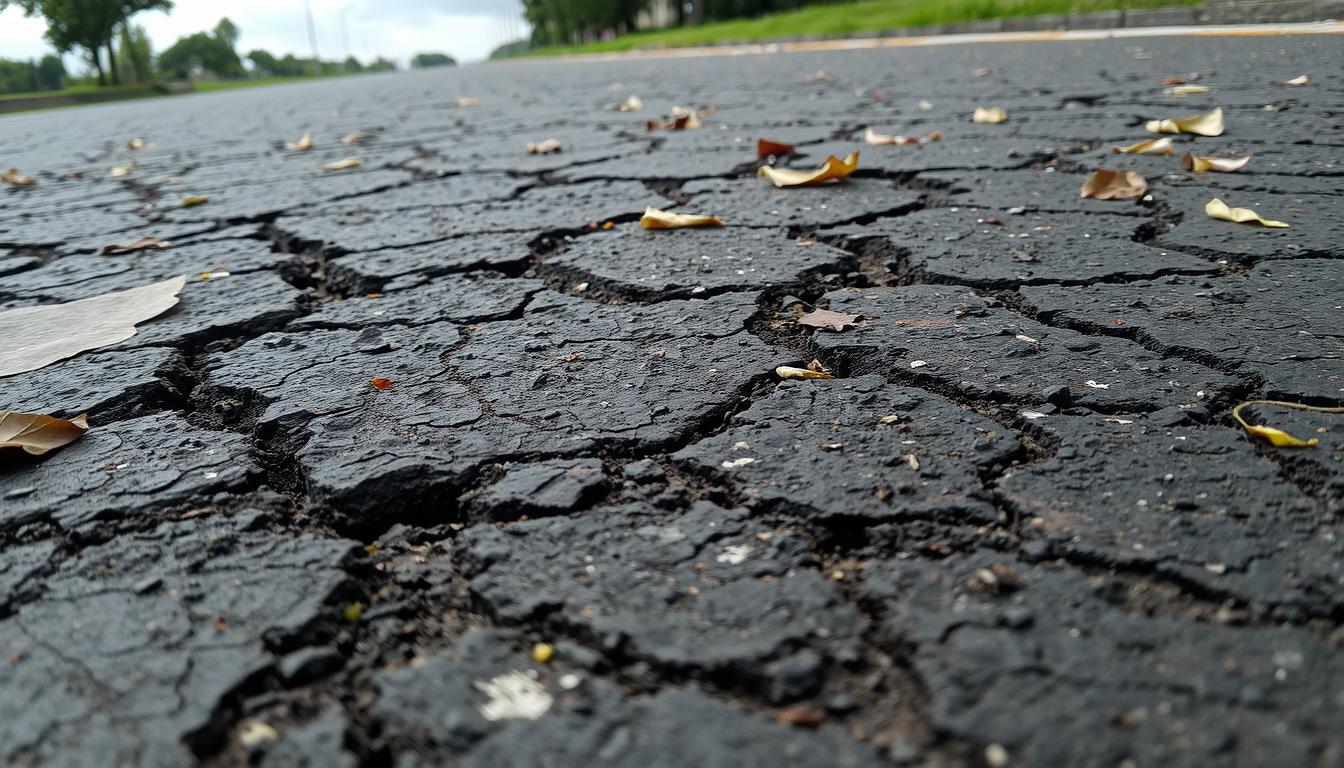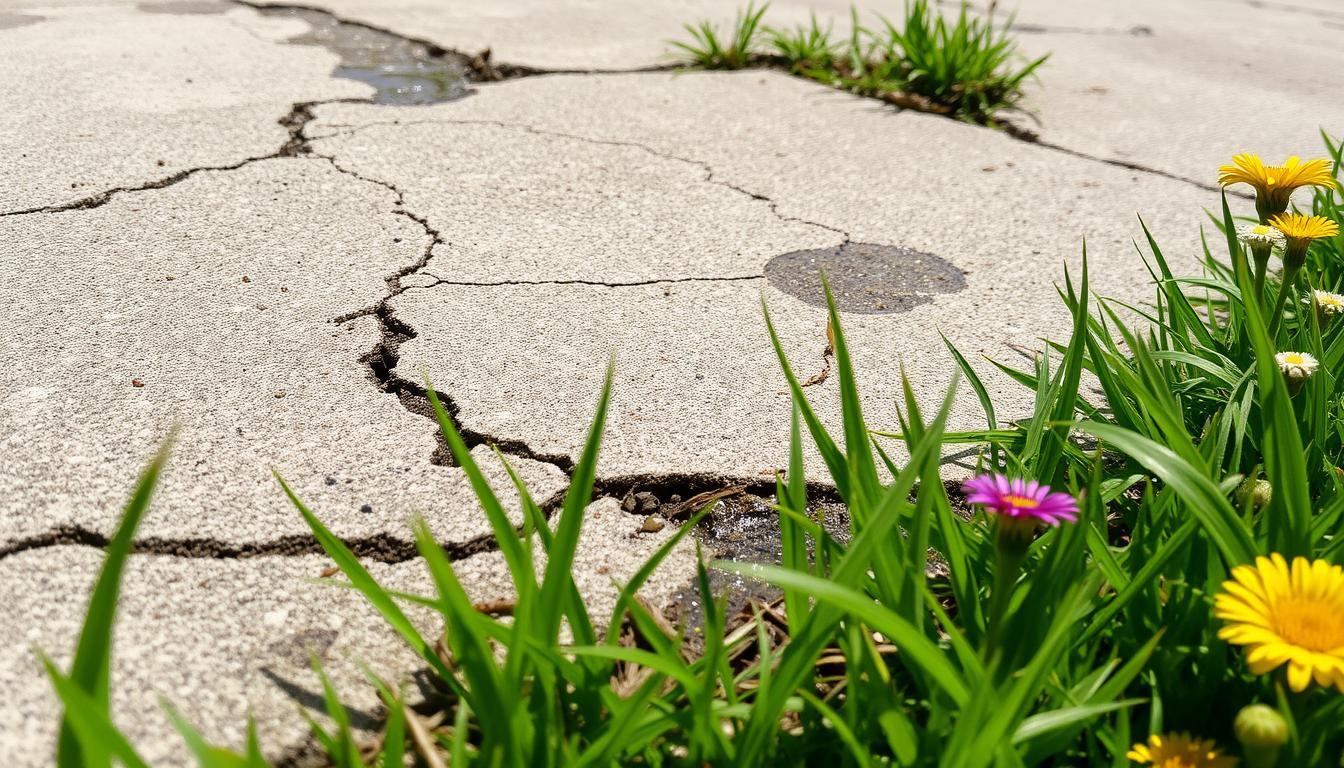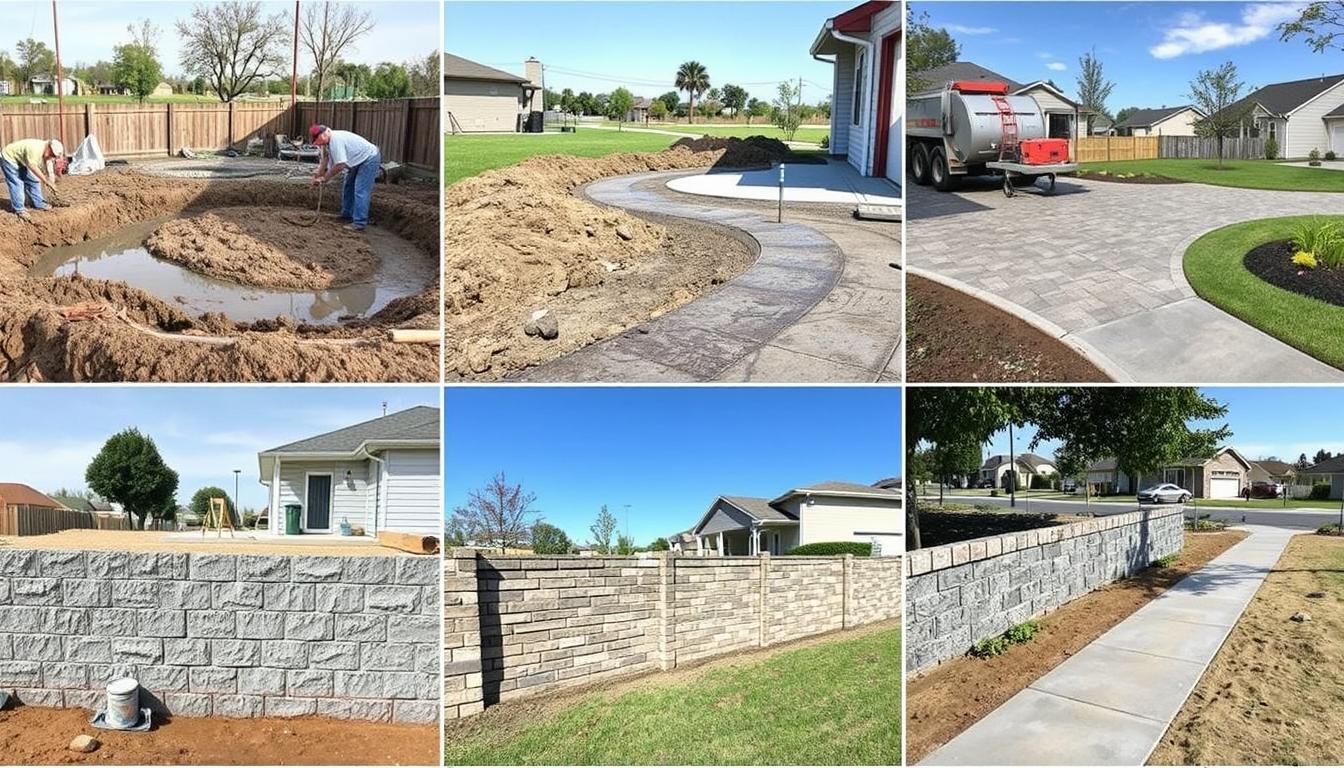Ever wonder what causes cracks and potholes in asphalt? Or why some roads get damaged fast, while others last years? Many factors can wear out asphalt, causing safety issues and costly repairs. This article explores why pavement gets damaged, like when temperatures change, heavy things drive on it, and nature affects it. It highlights the importance of keeping asphalt in good shape.
Key Takeaways
- Crumbling asphalt can lead to significant safety hazards on roads.
- Temperature changes and heavy traffic loads significantly contribute to cracks.
- Water intrusion is a major factor in the development of potholes.
- Proper installation and maintenance practices are critical for asphalt longevity.
- Timely interventions can prevent extensive asphalt deterioration.
Understanding the Composition of Asphalt
Knowing what asphalt is made of is key to making it last longer and work better. Asphalt is mostly made up of stones and sand mixed with a sticky substance called bitumen, or tar. The mix usually has 80% aggregates and 20% bitumen. The quality of these materials greatly affects how long the pavement lasts.
The Role of Tar and Aggregate
Tar holds everything together in asphalt, while stones and sand give it strength. Using top-notch materials can cut down on cracking by 20-30%. Poor drainage can lead to alligator cracking, where cracks look like an alligator’s skin. Regular asphalt maintenance helps prevent these issues and keeps the pavement in good shape.
Importance of Proper Mixing
Getting asphalt components mixed right is critical for a strong finish. When mixed well, asphalt can handle temperature changes and heavy loads better. If mixing is off, asphalt can develop weak spots, leading to cracks and potholes. Taking care of asphalt early on can make it last longer.
Common Causes of Cracks in Asphalt
Asphalt surfaces can deteriorate in many ways, leading to cracks. Knowing why these cracks happen helps us keep the pavement in good shape longer. Things like temperature changes, environmental factors, and heavy traffic all play a part in asphalt damage.
Temperature Fluctuations
Changes in temperature can harm asphalt, making it expand and contract. This can cause cracks, mainly because the asphalt can’t handle the changes well. Places with big temperature swings are more at risk. If not fixed, this can cut the pavement’s life in half.
Environmental Factors
Water getting into the asphalt is a big problem, causing 70% of damage. UV rays also make asphalt brittle, leading to cracks. Chemicals from de-icing salts can make things worse, causing different types of cracks, like alligator cracks, in busy areas.
Heavy Loads and Traffic
The weight of traffic is a big factor in asphalt cracks. Heavy vehicles can cause the asphalt to crack, looking like alligator skin. Every 1,000 heavy vehicles passing by can make cracks 5-10% worse. This shows why it’s key to design asphalt with traffic in mind and maintain it regularly.
Potholes: A Deeper Issue
Potholes are a big problem for road upkeep. Water intrusion in asphalt is a main cause. When asphalt cracks, water gets in and weakens the base.
Freeze-thaw cycles make this damage worse. This is why potholes are such a big deal.
Water Intrusion
Water is key in pothole formation. It gets into the asphalt and weakens the base. This leads to cracks and potholes.
Regular upkeep, like sealcoating, can help. It keeps water out and makes asphalt last longer.
Subgrade Issues
The subgrade’s condition affects pothole formation. A solid, well-drained base is essential. Poor drainage and bad grading lead to water buildup.
This weakens the asphalt and causes potholes. Spotting subgrade problems early helps fix them and keeps the road stable.
Impact of Freeze-Thaw Cycles
Places with big temperature swings are more prone to potholes. Freezing water expands and puts pressure on the asphalt. When it melts, the asphalt contracts.
This cycle of stress leads to cracks and potholes. Fixing freeze-thaw damage is key to managing roads well.
The Lifecycle of Asphalt Pavement
Understanding the asphalt lifecycle is key to managing pavement. It starts with installation and goes through stages until it wears out. When damage shows, it’s time for maintenance. Quick action can extend the life of the asphalt.
Signs of Wear and Tear
Asphalt ages, it faces many challenges. Cracks, fading, and rough surfaces are common signs of damage. These problems come from weather, heavy traffic, and poor drainage.
For example, transverse cracks happen in cold weather. Alligator cracks show stress from heavy vehicles. Watching for these signs helps decide the best maintenance steps.
Maintenance Practices
Keeping asphalt in good shape is key. Sealcoating and crack sealing can extend its life by up to 30%. These steps prevent small issues from becoming big problems.
Without regular care, asphalt can develop potholes and wear faster. This highlights the importance of maintenance.
Repair vs. Replacement
Deciding between repair or replacement depends on the damage’s extent. Small issues can be fixed with care. But, severe damage might require a full replacement.
Knowing when to repair or replace can save money and ensure safety. Seeking expert advice is essential for effective pavement care.
The Effect of Sunlight and UV Rays
Sunlight and UV rays can damage asphalt, making it brittle over time. This damage comes from UV rays causing a chemical breakdown. Understanding how UV rays affect asphalt is critical for its longevity.
Oxidation Process
When sunlight hits asphalt, it starts an oxidation process. This process uses up oils in the asphalt, making it less flexible. As a result, the asphalt becomes dry and more prone to cracking.
Impact on Asphalt Flexibility
Asphalt loses flexibility when it oxidizes. This makes it harder to handle stress and strain. Issues like alligator cracking, common in busy areas, can occur. Seal coating helps protect asphalt from UV damage, keeping it strong and lasting longer.
Importance of Proper Installation
Proper asphalt installation is vital for long-lasting pavements and fewer repairs later. Choosing the right contractor is critical. Their skills greatly impact the quality of the installation. Every detail, from materials to execution, depends on the contractor’s abilities.
Choosing the Right Contractor
Look for a contractor with a good track record and the right certifications. They should know how important quality installation is. They should use the best materials and techniques.
They should also have references and show off their past successes. This shows they can do high-quality work.
Factors in Quality Installation
Quality installation depends on several key factors. The right thickness of asphalt is essential for durability. Using the right techniques is also important.
Ignoring these can cause problems like cracks or potholes. Making sure the asphalt is well-compacted is also vital. It helps prevent damage to the pavement.
Role of Compaction
Compaction is a critical step in asphalt paving. It affects how long the pavement lasts. Proper compaction reduces air pockets and increases density.
This makes the pavement more durable. Professionals aim for the best compaction levels. This prevents issues like cracking and wear. Ignoring compaction can lead to more maintenance costs later.
Preventive Measures for Asphalt Longevity
To keep asphalt surfaces in good shape, it’s important to take preventive steps. Using strategies to preserve asphalt can make it last longer and save money on repairs. Important maintenance tasks include regular seal coating, fixing problems quickly, and having good drainage systems.
Regular Seal Coating
Seal coating every 2 to 3 years adds a protective layer and stops cracks from forming. This can make asphalt last up to 30% longer. It’s key to stopping cracks before they turn into bigger problems like potholes.
Timely Repairs
Fixing small cracks right away is vital. If not, they can grow into potholes, costing a lot to fix. Quick repairs keep the surface in good shape and can cut repair costs by half.
Effective Drainage Systems
Good drainage is essential for asphalt. It can prevent up to 80% of water damage, like cracks and potholes. Water can cause damage, more so in busy areas where it can lead to rutting. Having the right drainage helps avoid immediate damage and keeps asphalt durable for longer.
How HT Paving and Seal Coating Services Can Help
Choosing HT Paving and Seal Coating Services means getting tailored asphalt solutions. Our team offers expert solutions for both residential and commercial paving. We know the specific needs of each project.
Comprehensive Asphalt Solutions
We use top-quality materials and proactive maintenance to avoid expensive fixes. Fresh asphalt needs sealing 30 to 90 days after it’s cured. This step ensures it stays protected. Our advanced methods result in long-lasting, durable results.
Residential and Commercial Expertise
HT Paving and Seal Coating Services is perfect for both homes and businesses. Sealcoating improves the look and function of driveways. We recommend sealcoating every 2 to 5 years, depending on usage.
Commitment to Customer Satisfaction
We aim to make our customers happy. We offer advice tailored to your location and traffic levels. Our sealants dry quickly, allowing you to use your driveway in 24 hours. Trust us to keep your asphalt looking great for years.
Contact Us for Your Asphalt Needs
Need reliable asphalt maintenance, repair, or installation? Contact HT Paving at (415) 774-6424. Our team offers top-notch paving services in the Bay Area. We serve both homes and businesses with our quality care and support.
HT Paving serves the Bay Area and nearby areas with a promise of excellence. Our mission is to provide effective solutions that focus on safety, customer happiness, and quality work. We know that nearly 90% of asphalt damage comes from moisture, so we take steps to prevent it.
Don’t let cracks and potholes get worse. Our expert team is ready to protect your asphalt investment. Call us today to discuss your needs. Let us help keep your pavement safe, long-lasting, and looking great.

